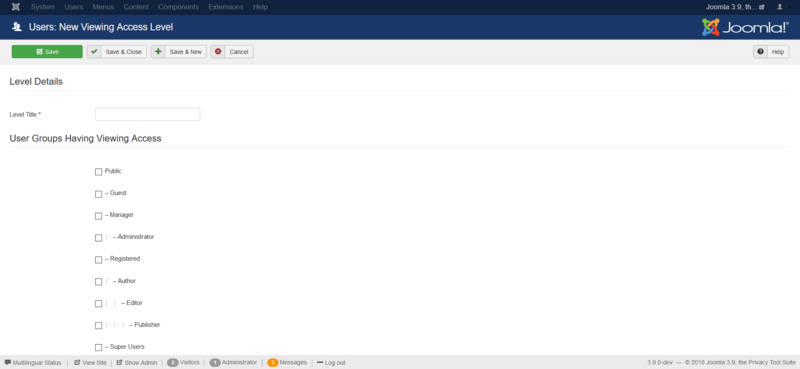Users Access Levels Edit/it: Difference between revisions
From Joomla! Documentation
Updating to match new version of source page |
Updating to match new version of source page |
||
| Line 1: | Line 1: | ||
<noinclude><languages /></noinclude> | <noinclude><languages /></noinclude> | ||
{{Chunk30:Help_screen_Description_Header/en}} | |||
Access levels control which users can view which objects on your site. Objects include menu items, modules, categories, and component items (articles, contacts, and so on). Each object in the site is assigned to one access level. User groups are also assigned to each access level. | Access levels control which users can view which objects on your site. Objects include menu items, modules, categories, and component items (articles, contacts, and so on). Each object in the site is assigned to one access level. User groups are also assigned to each access level. | ||
If a user is a member of a group that in turn has permission for an access level, then that user can view all objects assigned to that access level. It is important to understand that user groups can be arranged in a parent-child hierarchy. If so, then a child group has access to all access levels that the parent group has access to. So you don't need to assign a child group access to levels that its parent group already has access to. | If a user is a member of a group that in turn has permission for an access level, then that user can view all objects assigned to that access level. It is important to understand that user groups can be arranged in a parent-child hierarchy. If so, then a child group has access to all access levels that the parent group has access to. So you don't need to assign a child group access to levels that its parent group already has access to. | ||
{{Chunk30:Help_screen_How_To_Access_Header/en}} | |||
{{Chunk30:Help_screen_How_To_Access_Add/en|Access Level}} | |||
{{Chunk30:Help_screen_How_To_Access_By_Button/en|Users}} {{Chunk30:Help_screen_How_To_Access_By_Sidebar/en|Viewing Access Level}}{{Chunk30:Help_screen_How_To_Access_By_Button/en|New|toolbar}}. | |||
{{Chunk30:Help_screen_How_To_Access_By_Menu/en|Users,Access Levels,Add New Access Level}}. | |||
{{Chunk30:Help_screen_How_To_Access_Edit/en|Access Level}} | |||
{{Chunk30:Help_screen_How_To_Access_By_Title/en|Access Level's|Name}} | |||
{{Chunk30:Help_screen_How_To_Access_By_Checkbox/en|Access Level's}} | |||
{{Chunk30:Help_screen_Screenshot_Header/en}} | |||
[[Image:help-3x-users-user-manager-add-new-viewing-access-level-en.png|800px|border]] | |||
== | ==Details== | ||
*'''Level Title:''' Enter a Title for this Access level. | |||
== Toolbar== | == Toolbar== | ||
Revision as of 08:20, 25 October 2021
Description
Access levels control which users can view which objects on your site. Objects include menu items, modules, categories, and component items (articles, contacts, and so on). Each object in the site is assigned to one access level. User groups are also assigned to each access level.
If a user is a member of a group that in turn has permission for an access level, then that user can view all objects assigned to that access level. It is important to understand that user groups can be arranged in a parent-child hierarchy. If so, then a child group has access to all access levels that the parent group has access to. So you don't need to assign a child group access to levels that its parent group already has access to.
How to Access
Add a new Access Level
- Click the Users button in the Control Panel
- Select Viewing Access Level in the left sidebar
- Click the New button in the toolbar.
- Select Users → Access Levels → Add New Access Level from the dropdown menu of the Administrator Panel.
Edit an existing Access Level
- Click on an Access Level's Name.
- Check the Access Level's Checkbox
- Click the Edit button in the toolbar.
Screenshot
Details
- Level Title: Enter a Title for this Access level.
Toolbar
At the top left you will see the toolbar:
The functions are:
- Save. Saves the access level and stays in the current screen.
- Save & Close. Saves the access level and closes the current screen.
- Save & New. Saves the access level and keeps the editing screen open and ready to create another access level.
- Cancel. Closes the current screen and returns to the previous screen without saving any modifications you may have made.
- Help. Opens this help screen.
Quick tips
If you add a new group, you may need to edit any access levels that this group should have access to.
